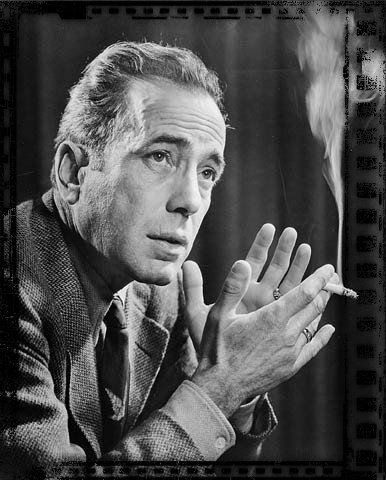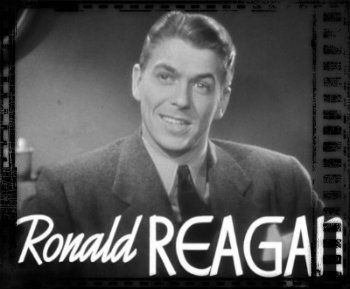
“He Would Have Made a Great Rick!”
Grove Koger Talks with Albert Carroll about the Bogart Presidency
“Ann Sheridan and Ronald Reagan co-star for the third time in Warner’s Casablanca, with Dennis Morgan also coming in for top billing. Yarn of war refugees in French Morocco is based on unproduced play by Murray Burnett and Joan Alison.” —Hollywood Reporter, January 5, 1942
With the passage of time and the deaths of many key figures, the surviving members of President Bogart’s staff have begun to speak out. Bogart was famously tight-lipped, but the realization seems to have dawned on his friends and associates that if they want to add their private recollections to the public record, now is the time.
Bogart’s international achievements and domestic crises are well documented. Now the memoirs of press secretary and confidant Albert Carroll, Looking Back, Pressing Ahead, scheduled to be published next month by Random House, promise to lift the veil on many of the inner workings of the Bogart White House.
I caught up with Carroll last week in Los Angeles.
Al, sum up the Bogart years in a sentence or two.
Grove, the Bogart presidency was the end of an era. Bogart laid the groundwork for much that came afterward, but I suggest in my book that he was primarily concerned with the past. It haunted him.
Hence your title?
Absolutely. Bogart himself looked back a good deal. He was the oldest man ever elected president, and at his age he knew he didn’t have unlimited time. His marriage to Betty [former First Lady Lauren Bacall] had come relatively late in his life, his first child was born when he was 49, and he had a sense of his own mortality. Not that he ever spoke openly about it, of course. He wasn’t the type. And he discouraged his friends and his staff too. That’s why so much of this stuff is new to the public.
His own mortality . . . Was he depressed? Despondent?
I wouldn’t say depressed, but certainly fatalistic. He had stopped drinking the morning after he accepted the Democratic nomination, but he was afraid his health was shot.
You suggest that having to give up so many friends also affected him.
It did. Bogie knew he had to project a more wholesome image than he had cultivated in Hollywood. To some extent again this was public window dressing. As I indicate in my book, he talked regularly to [Frank] Sinatra by phone, and he kept in touch with [Claude] Rains and [Peter] Lorre, but the days of boozy camaraderie he had enjoyed so much were over.
You knew Bogart from Hollywood, didn’t you?
I did, but just barely. I handled the publicity for his last picture before he entered politics, We’re No Angels. (Great flick, by the way.) I stayed on with Paramount after that, but when Bogie announced his candidacy he called me and asked if I’d come on board. I jumped at the chance.
I know our readers are especially curious about Bogart’s surprising taste in movies. There have already been reports about this, so maybe it’s fair game. What can you tell us without giving away too much?
I think you must be referring to the Casablanca story.
As you know, it had been the practice of Bogie’s predecessors in the White House to relax at the end of the day, as the press of events allowed, of course, with a movie. Down in the screening room. The studios had been glad to oblige with prints of any feature the President expressed an interest in, and of course Bogie’s connections didn’t hurt either! [laughs] It was my job, one of my jobs, to handle the details.
Strangely enough, Bogie didn’t enjoy his own movies. He was a perfectionist, and too often, I think, he dwelt on his mistakes. Anyway, he probably watched every movie made in the last thirty years except his own. But there was one in particular—and I know this is what you’re after—that he watched again and again. Usually late at night. Usually by himself. He had me buy a print, and then buy another one when the first one wore out. It was a 1942 production called Casablanca. Your readers may not be familiar with it, but it was a Ronald Reagan vehicle. Eminently forgettable. Betty refused to watch it after the first couple of times, and most of the staff begged off.
So Bogart loved it and everybody else hated it?
Grove, that’s the odd thing. I can’t say that Bogie liked it at all. He snorted at Reagan’s lines, and wasn’t much happier with Dennis Morgan’s performance. It was a typical Warner Bros. product . . . No, Bogie didn’t like it.
And yet . . .
And yet, he saw something in it. I don’t know if you’re familiar with Casablanca, but it’s about a nightclub owner in Morocco, Rick something, during the war, the Second World War. Ann Sheridan plays the love interest, and she and Reagan had this thing going back in Paris. If you haven’t seen it, try to find a copy. [laughs] Everybody will be wanting see it now, and I’m sure Ronnie’s kids will appreciate any extra royalties that might come their way. I think he ended up shilling for General Electric on TV.
Anyway, Bogie couldn’t get enough of it. We used to joke about how he saw himself as Rick, saw himself as this weary, cynical character who nevertheless pulls the thing off. Very 1940’s, very American in fact, if you can overlook Reagan’s wooden delivery. It’s the attitude that got us through the war, I guess, and that allowed Bogie to go ahead with the Cuban settlement that the Republicans pilloried him for.
In a lot of ways too it’s the attitude that got him through the [Ingrid] Bergman scandal and his final illness. He was a good President, but hell, he would have made a great Rick!
Casablanca. I’m sure we’ll all be looking for it.
Good luck, Grove. It’s been hard to find. But maybe that’s about to change.
Good talking to you, Al.
Likewise. Let’s do it again soon.

* * *
Grove Koger works as an adjunct reference librarian at Albertsons Library, Boise State University. He is the author of a play, Ruby Testifies (Black Box Theatre, Bloomington, Indiana, 1990), and a survey of travel literature, When the Going Was Good (Scarecrow Press, 2002), and has published short fiction in MicroHorror, Absinthe Revival, Bewildering Stories, and Death Head Grin.
Where do you get the ideas for your stories?
As a reference librarian, I come across lots of odd bits of information. Most of the time they remain odd bits, but sometimes, as in this case, they take root and grow.
Printed reports from 1942 that Ronald Reagan would star in a motion picture to be called Casablanca are genuine, but they were probably baseless and were planted for their publicity value. Would the movie have been as successful without Humphrey Bogart? It’s hard to imagine. Would Bogart have turned to politics in later life? Probably not. Although he identified himself as a Democrat, he wasn’t particularly active—and besides, he died at a relatively early age. But, as John O’Hara once remarked about the premature death of George Gershwin, I don’t have to believe that if I don’t want to.









0 comments:
Post a Comment